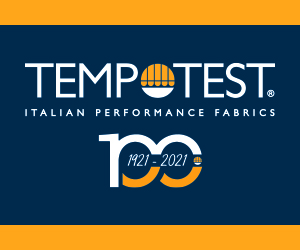Mundotextil Plans to Build Own Facilities, Brand in Key Markets
January 5, 2001
Caldas de Vizela (Portugal) — With a turnover of around $40 million in 1999, Mundotéxtil is the second largest Portuguese producer and exporter of terry towels. The company's product range includes piece-dyed towels and double jacquards as well as blends of linen and modal with cotton. The emphasis is on new designs and updated collections for the top end of the residential market.
Established in 1975, Mundotéxtil is a completely vertical mill. The two spinning divisions, comprising 11,000 spindles, produce 200 tons a month of both carded and combed 100% cotton yarns. Special yarns and blends are imported from several countries including Egypt.
Most yarns are ring spun, with some open-end spinning machinery also in operation.
Mundotéxtil has just started production of combed cotton yarns using the latest short-staple combing machines from Rieter.
Mundotéxtil has 110 Sulzer Textil looms (60 jacquard and 50 dobby) currently in service, producing 450 tons a month of terry towel products. These are exported worldwide, principally to Europe and North America. The U.K. is the biggest single export market at present, followed by the U.S.A. and France. The completely modernized and automated dyeing and finishing department is located in the weaving plant and is geared to the weaving capacity.
At present 50% of the company's production is for private label products with 50% for the company's own collection. However, managing director Abilio Barbosa de Matos revealed that the plan is to have 70% of output for Mundotéxtil's own brands within 2-3 years.
While much of the recent investment has been to increase both production and productivity as well as developing designs and improving quality, Mundotéxtil has also made some direct investments in certain markets to ensure top quality service on deliveries and quick response to customers.
The company plans to have for its own facilities in each key market. In the U.S. market, Bianca USA already stocks the main ranges for weekly delivery, while Realto operates similarly in Italy. Mundotéxtil will cover France in 2001, with plans for Germany covering the Netherlands and some East European countries such as the Czech Republic and Hungary in the future.
Barbosa de Matos noted that there was now a big demand for combed cotton products and also for 600 gsm qualities. "Our minimum towel weight is now 500 gsm with an average of 580 — this is a lot higher than a few years ago," he said.
The company increased sales this year in the key U.S. and U.K. markets, mainly due to the favorable exchange rate of the euro with the dollar and pound, respectively. Almost all other markets are stable or have shown a slight increase.
With a New York showroom on Fifth Avenue, Mundotéxtil's U.S. marketing strategy is to promote its brand names and to attract the interest of specialty stores. The company hopes to have around 30% of sales to the U.S. market, a level it believes it can achieve by 2002.
"Demand is huge in the U.S. at the moment, partly because of the problems with the domestic mills," said Barbosa de Matos. "We started investing in this market at the right time.
"In the past, Portuguese mills were not noted for their quality and delivery. Six or seven years ago we decided to focus on two key principles: delivery on time and total quality in every activity and operation. This means continual investment."
The focus is clearly on product innovation. Mundotéxtil has successfully introduced new yarns to achieve a wide range of high quality and fashionable bath towels. "We have new designs every two weeks which we can show to customers," said Barbosa de Matos.
"And we have reorganized our business for the future. Although the market will, to some extent, depend on currency fluctuations, we do have high expectations for Europe, and we are looking for a revival in Germany.
"As we are operating at the high end of the market, we see no problems for MundotÃxtil. We are still very small in the U.S. and have a very long way to go. But here, as in other markets, we have to be more aggressive to keep ahead of the competition."
Established in 1975, Mundotéxtil is a completely vertical mill. The two spinning divisions, comprising 11,000 spindles, produce 200 tons a month of both carded and combed 100% cotton yarns. Special yarns and blends are imported from several countries including Egypt.
Most yarns are ring spun, with some open-end spinning machinery also in operation.
Mundotéxtil has just started production of combed cotton yarns using the latest short-staple combing machines from Rieter.
Mundotéxtil has 110 Sulzer Textil looms (60 jacquard and 50 dobby) currently in service, producing 450 tons a month of terry towel products. These are exported worldwide, principally to Europe and North America. The U.K. is the biggest single export market at present, followed by the U.S.A. and France. The completely modernized and automated dyeing and finishing department is located in the weaving plant and is geared to the weaving capacity.
At present 50% of the company's production is for private label products with 50% for the company's own collection. However, managing director Abilio Barbosa de Matos revealed that the plan is to have 70% of output for Mundotéxtil's own brands within 2-3 years.
While much of the recent investment has been to increase both production and productivity as well as developing designs and improving quality, Mundotéxtil has also made some direct investments in certain markets to ensure top quality service on deliveries and quick response to customers.
The company plans to have for its own facilities in each key market. In the U.S. market, Bianca USA already stocks the main ranges for weekly delivery, while Realto operates similarly in Italy. Mundotéxtil will cover France in 2001, with plans for Germany covering the Netherlands and some East European countries such as the Czech Republic and Hungary in the future.
Barbosa de Matos noted that there was now a big demand for combed cotton products and also for 600 gsm qualities. "Our minimum towel weight is now 500 gsm with an average of 580 — this is a lot higher than a few years ago," he said.
The company increased sales this year in the key U.S. and U.K. markets, mainly due to the favorable exchange rate of the euro with the dollar and pound, respectively. Almost all other markets are stable or have shown a slight increase.
With a New York showroom on Fifth Avenue, Mundotéxtil's U.S. marketing strategy is to promote its brand names and to attract the interest of specialty stores. The company hopes to have around 30% of sales to the U.S. market, a level it believes it can achieve by 2002.
"Demand is huge in the U.S. at the moment, partly because of the problems with the domestic mills," said Barbosa de Matos. "We started investing in this market at the right time.
"In the past, Portuguese mills were not noted for their quality and delivery. Six or seven years ago we decided to focus on two key principles: delivery on time and total quality in every activity and operation. This means continual investment."
The focus is clearly on product innovation. Mundotéxtil has successfully introduced new yarns to achieve a wide range of high quality and fashionable bath towels. "We have new designs every two weeks which we can show to customers," said Barbosa de Matos.
"And we have reorganized our business for the future. Although the market will, to some extent, depend on currency fluctuations, we do have high expectations for Europe, and we are looking for a revival in Germany.
"As we are operating at the high end of the market, we see no problems for MundotÃxtil. We are still very small in the U.S. and have a very long way to go. But here, as in other markets, we have to be more aggressive to keep ahead of the competition."
















